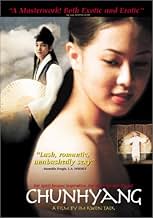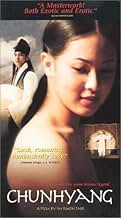IMDb RATING
7.0/10
1.9K
YOUR RATING
A governor's son falls in love and marries a beautiful girl, the daughter of a courtesan. Their marriage is kept a secret from the governor who would immediately disown him if he found that ... Read allA governor's son falls in love and marries a beautiful girl, the daughter of a courtesan. Their marriage is kept a secret from the governor who would immediately disown him if he found that his son married beneath him.A governor's son falls in love and marries a beautiful girl, the daughter of a courtesan. Their marriage is kept a secret from the governor who would immediately disown him if he found that his son married beneath him.
- Director
- Writers
- Stars
- Awards
- 8 wins & 11 nominations total
Seong-nyeo Kim
- Wolmae
- (as Sung-nyu Kim)
Lee Jung-hun
- Byun Hak-do
- (as Lee Do-gyeom)
Seok-goo Lee
- Officer
- (as Suk-koo Lee)
- Director
- Writers
- All cast & crew
- Production, box office & more at IMDbPro
Featured reviews
I am a Korean linguist and use Korean movies to keep up on the language and have really fallen in love with them over the last few years. My current favorite is JSA, followed closely by Shiri. I just happened to catch Chunhyang on the Sundance channel and it was just not your typical "everybody dies" Korean dramatic movie. Although, what little I know of Korean culture seems to portray life as always having misfortunes,because thats just how life is, this movie was a pleasant surprise. It was kind of like Romeo and Juliet who forgot they were supposed to die. The "panjori" was excellent as well.
Kwon-Taek-I'm, the talented Korean director, gives us a gorgeous film in "Chunhyang". Korean cinema rely heavily in presenting well crafted movies that rely heavily in their rich folklore. As witnessed here, this film will delight fans of Mr. I'm, as well as give the viewer an appetite to discover other films from that country that are not only beautiful to watch, but also gives us films that are original, not following well established patterns, as it's the case with most of the commercial cinema these days.
"Chunhyang" offers us a folk story in the traditional Korean style in which a singer is accompanied by a an instrument similar to our guitar and we learn about it as it enfolds mesmerized by the images one witnesses on the screen.
We saw "Chungyang" in its original release and caught with it again with it in DVD format recently. This movie is highly recommended to those looking for a different kind of story told magnificently by Kwon-Taek-I'm.
"Chunhyang" offers us a folk story in the traditional Korean style in which a singer is accompanied by a an instrument similar to our guitar and we learn about it as it enfolds mesmerized by the images one witnesses on the screen.
We saw "Chungyang" in its original release and caught with it again with it in DVD format recently. This movie is highly recommended to those looking for a different kind of story told magnificently by Kwon-Taek-I'm.
This is a lush and beautiful Korean fairy tale with "Romeo and Juliet" like qualities. As I understand it, it is traditionally told in "Pansori" style with a rhythmic singer/storyteller accompanied by a drummer. The film uses a pansori concert as the framework to tell the tale and interweaves the action with the singer's narration to good effect. The story is classic, star-crossed lovers separated by societies rules. A governor's son falls in love with a concubine's daughter and their love must endure long separation and an evil lord's lust. Classic story and an interesting story-telling method make for a truly entertaining film.
With the Korean story telling tradition performed on stage, it was a interesting and novel way to tell the story. The story was beautiful and the moving. I figure it to be a Korean fairy tale given its happy ending and having a moral to the story.
I didn't find the story telling method completely successful. The music and drumming added tension to the film, but the Pansori seemed to intrude in the film too frequently, describing everything that is going on when it could be done visually, rendering many scenes as some sort of announcement, not letting the ambiance set in. The scene of the whipping seemed to be a little forced, having the camera show us various audience members crying, as if we don't know this is a dramatic situation. It might have worked better if they let the dialogue be spoken by the character Chunghyang instead of the Pansori, since the Pansori does not have much dynamic range in his voicing, being always loud. The character saying it while being whipped gives a different impression than the Pansori screaming it.
But all in all, still a good film.
I didn't find the story telling method completely successful. The music and drumming added tension to the film, but the Pansori seemed to intrude in the film too frequently, describing everything that is going on when it could be done visually, rendering many scenes as some sort of announcement, not letting the ambiance set in. The scene of the whipping seemed to be a little forced, having the camera show us various audience members crying, as if we don't know this is a dramatic situation. It might have worked better if they let the dialogue be spoken by the character Chunghyang instead of the Pansori, since the Pansori does not have much dynamic range in his voicing, being always loud. The character saying it while being whipped gives a different impression than the Pansori screaming it.
But all in all, still a good film.
Before video, before film, before printing, before writing -- people told and sang stories.
"Chunhyang" is a wonderful way to experience this oral tradition, listening to the music of language as chanted by a Pansori telling a Korean folk tale. For those of us without facility in the Korean language, the film paints for us the images conjured by the singer. These are beautiful images of a colorful, far-away land in ancient times -- images locked into the race memory of the Korean people familiar with the story, but now on the screen for our benefit as well.
This collision of old and new art forms generates a synergy evident, for example, in the scene in which Chunhyang is beaten for refusing to take to the evil lord's bed. Most of this takes place off-screen -- instead we see shots of the Pansori and of his audience, sitting on the edge of their seats and weeping as he tells of the heroine's defiance. It was one of the most gut-wrenching scenes I've experienced in many years.
"Chunhyang" is a wonderful way to experience this oral tradition, listening to the music of language as chanted by a Pansori telling a Korean folk tale. For those of us without facility in the Korean language, the film paints for us the images conjured by the singer. These are beautiful images of a colorful, far-away land in ancient times -- images locked into the race memory of the Korean people familiar with the story, but now on the screen for our benefit as well.
This collision of old and new art forms generates a synergy evident, for example, in the scene in which Chunhyang is beaten for refusing to take to the evil lord's bed. Most of this takes place off-screen -- instead we see shots of the Pansori and of his audience, sitting on the edge of their seats and weeping as he tells of the heroine's defiance. It was one of the most gut-wrenching scenes I've experienced in many years.
Did you know
- TriviaA "pansori" (on which this movie is based) was a four to six-hour long musical poem performed by a singer and a drummer.
- Quotes
Mongyong Lee: "Like the sun and the moon, my love will never change."
- ConnectionsVersion of Seong Chunhyang (1987)
- How long is Chunhyang?Powered by Alexa
Details
Box office
- Gross US & Canada
- $798,220
- Opening weekend US & Canada
- $14,052
- Jan 5, 2001
- Runtime
- 2h 17m(137 min)
- Color
- Sound mix
- Aspect ratio
- 1.85 : 1
Contribute to this page
Suggest an edit or add missing content























